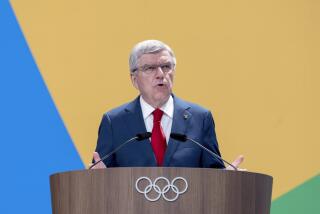Beijing chosen to host 2022 Winter Olympics, angering human rights groups
- Share via
Reporting from Beijing — Beijing will host the 2022 Winter Olympics, the International Olympic Committee announced Friday, making the Chinese capital the first city to host both a Summer and Winter Games.
Members of the IOC, meeting in Kuala Lumpur, Malaysia, announced the decision after a secret ballot, dealing a potential boon to the global winter sports industry but sparking outrage among activists and human rights groups who say the committee has rewarded China’s Communist Party during its strongest crackdown on dissent in decades.
The contest came down to Beijing and Almaty, Kazakhstan’s largest city, after other contenders melted away, with citizens and politicians in democratic countries including Sweden, Norway and Poland voicing deep reservations about the cost of staging the event. That left the IOC -- which recently adopted sweeping reforms emphasizing environmental sustainability, cost-containment and human rights -- to choose between two autocratic states. China, with its rising economic and geopolitical clout, was widely considered the favored contender.
NEWSLETTER: Get the day’s top headlines from Times Editor Davan Maharaj >>
But the vote was extremely close, with 44 votes for Beijing and 40 for Almaty, with one abstention.
John J. MacAloon, a University of Chicago anthropologist and historian who has studied the Olympics extensively, described the human rights records of both countries as presenting the IOC with a “Hobson’s choice” of poor alternatives; he said that Beijing was “way worse than Almaty.”
“There is no hope that China would make any more progress on human rights than it did with the 2008 Games, and in fact things have declined radically since then under [President] Xi Jinping,” he said.
“The decision for Beijing over Almaty is the biggest mistake the IOC could make,” he added. “It makes a joke of the Agenda 2020 reforms” -- the reform package the IOC recently adopted that puts environmental sustainability, cost-containment and human rights near the top of the list in choosing host cities for the Games.
Xi, in recorded remarks to the IOC voters just before they cast their ballots, promised China would deliver a “splendid, fabulous and outstanding” Games.
Since Beijing launched its bid in 2013, Chinese officials have boasted of the country’s experience in hosting major international events, such as last year’s Asia-Pacific Economic Cooperation summit, the 2010 Shanghai World Expo, and, of course, the 2008 Summer Olympics. They have promised to build a range of sophisticated infrastructure (including a high-speed rail line), and employ 10 million people to ensure that the event runs smoothly.
Yet critics say that Beijing -- which will host the event jointly with Zhangjiakou, an industrial city 120 miles to the northwest -- is burdened by a host of major environmental and logistic issues, including air pollution, extreme water scarcity and a dearth of high mountains and natural snow.
Yet it is China’s human rights record that has attracted the most public scrutiny. Activists said that selecting China would send the wrong message to its ruling Communist Party which, in advance of the 2008 Olympic Games, promised to improve the country’s record on human rights, Internet censorship and press freedom.
The nongovernmental organization China Human Rights Defenders noted this week that conditions have deteriorated on all three fronts. Since March 2013, when Xi became China’s president, authorities have “arbitrarily detained” at least 1,800 people, the group reported, including more than 300 lawyers and human rights activists in a fresh crackdown that began earlier this month. Authorities have also tightened Internet controls and ratcheted up religious and cultural repression in the ethnically diverse far western areas Xinjiang and Tibet.
“To honor Beijing by awarding it another Olympic Games, even as its gross violations of the human rights of the Chinese people glare back at us, amounts to telling the victims of the Chinese government’s rights abuses that their human dignity does not count,” the organization in an open letter to the IOC on Tuesday.
Other critics of China had complained that the costly and tightly controlled 2008 Summer Games, while superficially a success, had resulted in the forcible relocation of 1.5 million people; the detention of disabled people and petitioners to “clean up” the city’s image; and only temporary relaxation of restrictions on the media.
“The 2008 Summer Olympics ... brought more humiliation than dignity and more sadness than joy to the people in China,” said an open letter penned by dozens of prominent Chinese dissidents, including Teng Biao, Hu Jia and Chen Guangcheng.
Environmentalists have questioned whether Beijing’s bid was practical, given that the smoggy, water-challenged city of 22 million would have to hold many of the alpine events more than 100 miles from the city center, amid mountains that receive about 8 inches of snow annually. (Beijing officials have said that the Games will rely on man-made snow.)
Margaret M. Gold, a British academic and co-editor of “Olympic Cities: City Agendas, Planning and the World’s Games, 1986-2016,” said that Beijing was the “safe bet” -- a wealthier city with a track record of hosting that was hard for the IOC to say no to, even though Beijing just hosted an Olympics in 2008. “Now, the real problem for Beijing will be snow,” she said.
Chinese authorities have said they have the resources -- and the experience -- to organize an outstanding Olympics. At a presentation in Kuala Lumpur this week, Beijing Mayor Wang Anshun presented the city as an “athlete-centered, sustainable and economical choice.” Xu Jicheng, an official from Beijing’s bid team, said China would take steps to improve the city’s notorious air pollution before the Games. “We have seven more years to go, and it will be sunshine and white cloud,” he said.
Beijing has promised to spend $3 billion on the event’s infrastructure and organization, a fraction of the $50 billion that Russia spent on the 2014 Winter Olympics in Sochi. The city plans to cut costs by reusing many of the venues it built for the 2008 Summer Olympics, including the iconic Bird’s Nest stadium and Water Cube, where American swimmer Michael Phelps won eight gold medals. Authorities also plan to build a Wi-Fi-equipped high-speed rail line linking Beijing and Zhangjiakou, reducing travel time between the two cities to 50 minutes.
According to Beijing’s bidding documents, the city will build the remainder of its Olympics infrastructure -- to include 12 competition stadiums and three training venues -- with renewable energy technology and “eco-friendly design and materials.”
On Beijing’s streets, excitement has been markedly muted compared with the national reverie that followed the IOC’s 2001 announcement that the city had won its 2008 Olympics bid.
On Tuesday, Chinese tourists milling around the Olympic Park in northern Beijing said they knew little about Beijing’s bid -- few could name the date of the impending announcement, the name of the city’s bidding rival Almaty, or even one Chinese winter sports star.
“I invited some colleagues at work to my apartment to watch the announcement [of the host city of 2008 Olympic Games] over drinks in 2001,” said Ruan Yangbin, a 35-year-old employee at a Japanese company in Shenzhen. “When Beijing won, I felt so proud of my country -- it demonstrated our nation’s power and strength. But I don’t sense such strong feelings now, with China’s continuous economic development and all the other major international events we’ve hosted.”
Officials have spun the Olympics as a way to boost interest in winter sports -- skiing and ice hockey have already started to gain traction among the country’s burgeoning middle class. “Winter sports is about to take off in China, and we have great potential,” former NBA star Yao Ming told Reuters this week.
Bob Mackin, a Canada-based journalist who closely follows the Olympic movement for the website Around the Rings, said that in the IOC’s deliberations, Beijing’s wealth and international profile may have trumped concerns about its environment and human rights record.
He noted that China has been trying to kindle interest in winter sports such as skiing and snowboarding, which could translate into big money for international companies. With the NHL recently drafting its first Chinese player, “the NHL must be salivating” over the growing interest among Chinese viewers, he said.
Almaty may be smaller and snowier than Beijing, he said. But for many, Beijing is just “too much of an opportunity to pass up.”
Harvard Zhang in the Times’ Beijing bureau contributed to this report.
ALSO:
China’s stock market drops 8.5%, its biggest single-day fall since 2007
Chinese escalator that crushed woman had design flaw, investigators say
In Chinese corruption case that began with Ferrari crash, former top official faces prosecution
More to Read
Sign up for Essential California
The most important California stories and recommendations in your inbox every morning.
You may occasionally receive promotional content from the Los Angeles Times.











